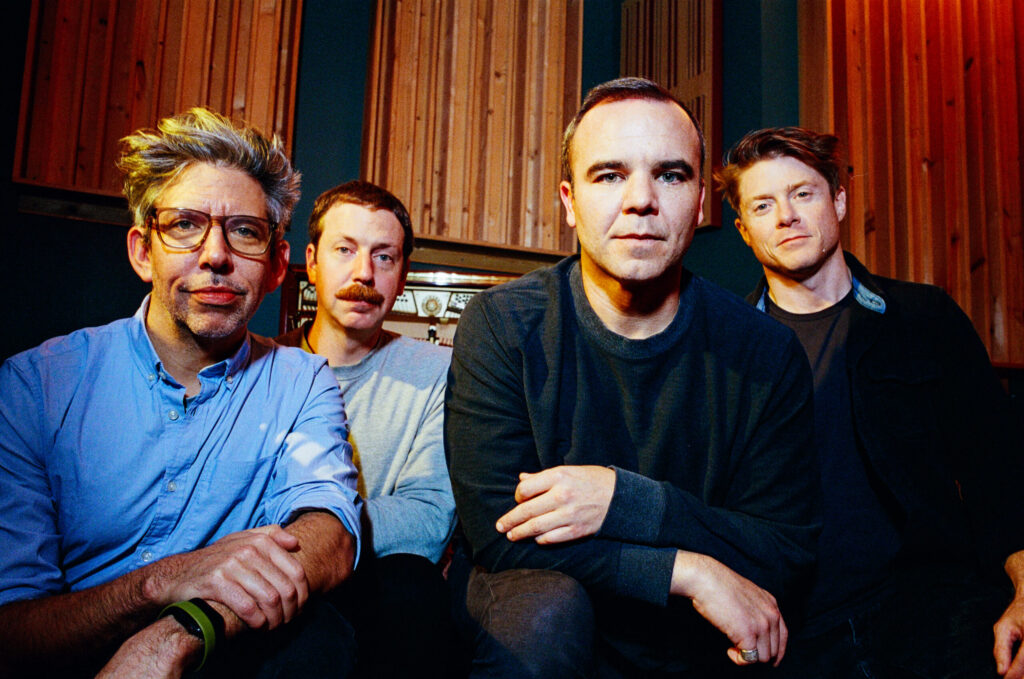

Prefer to listen instead?
Hear the full review of Caveman Wakes Up by Friendship—brought to you by Pixlehale. Honest critique, rich storytelling, and grounded cultural insight, now in audio form.
Waking to a World of Everyday Struggles
Philadelphia indie outfit Friendship returns with their fifth album, Caveman Wakes Up, a record that peels back the curtains on everyday life’s quiet dramas. Frontman Dan Wriggins sings in an unvarnished baritone that lends gravity to tales of work, faith, and loneliness. The album’s overarching concept evokes a modern caveman awakening to the strange realities of contemporary society – essentially an artful meditation on depression wrapped in wry storytelling and keen social observation. This latest release, their second on Merge Records, finds the band honing their blend of folk-rock intimacy and indie-rock experimentation.
Social Themes and Storytelling

Lyrically, Caveman Wakes Up shines a light on the mundane struggles of ordinary people, elevating them into poetic vignettes. Wriggins often chronicles “the common man wrestling with the crush of the mundane” – from dead-end jobs to distant dreams – with a mix of blunt honesty and subtle humor. On “Free Association,” he portrays post-breakup malaise through a mundane routine – even the act of complaining about work – to show how loneliness magnifies the ordinary. “Tree of Heaven” brilliantly encapsulates the isolation of being on life’s margins, describing a scene of standing outside a church listening to the choir’s voices bleed through the walls. It’s a vivid snapshot of feeling spiritually adrift in a community – a theme that resonates across the record’s social commentary. Elsewhere, “Resident Evil” couches an existential dread in domestic absurdity, culminating in the darkly comic question: “who’s that shithead in my living room, playing Resident Evil?” Throughout the album, despair and dry wit sit side by side, blurring “bleak humor with flashes of transcendence, where the sacred and profane blur.” In this way, Friendship confronts social alienation and mental health head-on, suggesting that waking up to reality is equal parts devastating and oddly funny.
Production and Sonic Landscape
Musically, Caveman Wakes Up expands Friendship’s alt-country roots into richer, more experimental territory. The production balances grit and grace: the band delivers a murky, poetic expansion of country-rock, rich with texture and experimentation. Indeed, the arrangements are full of character. “Resident Evil,” a standout track, rides on guitars that poke and prod à la Neil Young’s Crazy Horse, periodically erupting into feedback to mirror the song’s anxious mood. In “Tree of Heaven,” a martial drum stomp and an atonal violin line heighten the sense of outsider angst, making the listener feel that Sunday morning coldness of standing alone outside the sanctuary. By contrast, “Love Vape” offers a bass-heavy, mid-tempo bounce, painting the neon-lit tableau of a Philly smoke shop (complete with vivid details from a real smoke shop) over a surprisingly bright melody. These shifts in sound – from shambling guitars and occasional Mellotron swells to moments of almost Motown-like groove – serve the album’s themes by alternating between somber reflection and subtle relief. Wriggins’ voice, rough-hewn yet resonant, sits front and center in the mix, ensuring every line is delivered with an earnest weight that matches the subject matter.
Highlights and Impressions
Rather than a collection of singles, Caveman Wakes Up plays like a cohesive journal of working-class angst and hope. Late in the album, “All Over the World” repeats a phone-call refrain (“Hey buddy, where are you at? … I’m all over the world”) with mounting intensity, turning a simple greeting into an existential question, before the closing “Fantasia” ends on a quietly matter-of-fact note – a lover stepping out for another beer amid delicate strings. These final moments reinforce how Caveman Wakes Up finds profound meaning in humble, everyday scenes.
Verdict
On Caveman Wakes Up, Friendship stay true to their name – offering a candid, empathetic companion through life’s unglamorous moments. The album is at once grounded and artful, full of small indignities rendered with plaintive grace. Its social themes of alienation, faith, and labor feel timely and relatable, tackled with a clear-eyed poetry that never slips into melodrama. The production underscores these themes, from the emotional weight and casual surrealism in Wriggins’ lyrics to the careful interplay of instruments that add color to even the grayest narratives. If there’s a flaw, it’s that the tone can occasionally meander; some moments can be a rough place to hang out on repeat listens. But even this unevenness contributes to the sense of a genuine lived experience. Ultimately, Caveman Wakes Up stands as a compelling reflection on waking up each day to face a world that can be both black coffee bitter and quietly beautiful. In delivering hard truths with melodic finesse, Friendship have crafted a thoughtful album that invites us to share in the burden and the beauty of simply carrying on.
Sources: Key data and statements in this article are drawn from Stereogum, Pitchfork, Paste Magazine, BrooklynVegan, and Merge Records. Additional insights were sourced from official press releases, band interviews, and verified album reviews. All assertions are supported by these reliable sources, ensuring a fact-based, well-rounded perspective throughout the article.






